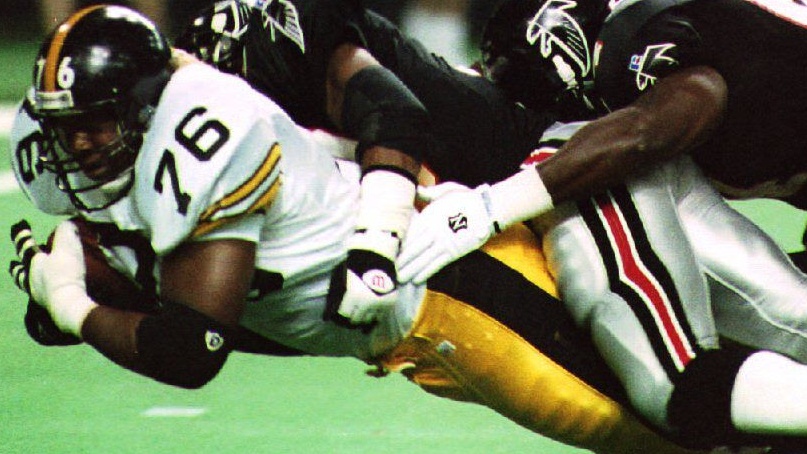Several Black former NFL players are coming forward about their struggle to receive support from the league and its oppressive procedures in determining who is eligible for the NFL’s concussion settlement program.
In an exclusive interview with Good Morning America, former defensive linemen Kevin Henry shared that he was denied entry twice into the program after suffering at least 10 concussions over a career that spanned eight years.
“Football doesn’t give you an expiration date, you just expire,” he said. “I’ve had 10 concussions or more. I’ve had at least 17 surgeries. 17. And I’m still getting them.”
EXCLUSIVE: Former football players accuse the NFL of avoiding paying head-injury claims based on a formula they say discriminates on the basis of race. https://t.co/emcAzUIHSe
pic.twitter.com/1YXhCTPSPg— Good Morning America (@GMA) February 3, 2021
After his playing days, Henry briefly went to work for Coca-Cola, but struggled due to the headaches, memory loss and depression he suspected were the results of head trauma, ABC News reports. The 52-year-old thought the NFL’s concussion settlement program could help him improve his mental health and get his life back on track.
In 2017, he went in for litany evaluations by a neuropsychologist and a neurologist, who determined that Henry was suffering from a “severe” cognitive impairment with signs of “mild dementia." The medical professionals’ findings qualified him for compensation from the league, but league officials denied Henry’s application on the basis of multiple factors, which include concerns about the legitimacy of his performance on the tests and the “incorrect” use of “normative scores.”
Two years later, Henry underwent testing by a different clinician. In this visit, the clinician incorporated the “full demographic correction” recommended in the league’s program manual. To his dismay, Henry didn’t qualify for compensation following the doctor’s evaluation, leaving him confused as to why former teammates were receiving the help that he wasn't qualifying for.
“I felt so betrayed and I still feel that way,” he said. “Two different systems? How can that be OK? Why should that be OK?”
After Henry joined former running back Najeh Davenport in a lawsuit against the NFL, accusing the league of discriminating against Black players, medical professionals that made decisions on the concussion program expressed on a listserv that many of the league’s final evaluations superseded their own, ABC News reports.
One neuropsychologist in the online group said the league’s program guidelines were strict and had little room for flexibility.
“I don't think we have the freedom to choose,” the clinician wrote. “If we do, apparently many of us have been doing it wrong.”
Another medical professional acknowledged that the “bottom line is that the norms do discriminate against Black players. So now what? In this time of reckoning, like many professions, I think we need to look closely at the expected and unexpected ramifications of our practices.”
However, the NFL has repeatedly criticized the lawsuit as “entirely misguided,” saying that the use of any demographic corrections to interpret test results is determined by “the sound discretion of the independent clinicians,” ABC News reports.
In December, a paper published in JAMA Neurology criticized the NFL’s program and the use of “race-adjusted norms as a crude proxy for a lifelong social experience," Dr. Katherine Possin of the Memory and Aging Center at the University of California, San Francisco, wrote.
“This case is reminiscent of a damaging, century-long history of assuming that differences on intelligence tests (IQ) are primarily inherited and then using this false assumption to legitimize the unequal distribution of resources by social class," she wrote.
The former players allege that corrections to the program are mandatory in order for the program to operate fairly for all players.
“I just want to be looked at the same way as a white guy,” Henry told ABC News. “We bust chops together, bro. We went out together and we played hard together. You know what I mean? It wasn't a white or Black thing. We lost together. We won together.”
An NFL spokesperson released a statement to ABC News saying that the concussion settlement, which has issued more than $800 million to former players and their families, was “agreed to by all parties, with the assistance of expert neuropsychological clinicians and approved by the courts more than five years ago” and “relied on widely accepted and long-established cognitive tests and scoring methodologies.”
The spokesperson added that “the settlement seeks to provide accurate examinations to retired players, and thus permits, but does not require, independent clinicians, to consider race in adjusting retired players’ test scores as they would in their typical practice.”
The league also emphasized that the collaboration with independent clinicians is a critical part of the program's evaluation process.
Attorney Christopher Seeger, who worked as class counsel for the former NFL players and negotiated the groundbreaking settlement with the league, requested in a statement that the court supervising the stewardship of the settlement clarify its terms.
“The use of race-based demographic norms is ultimately left to the clinical judgment of the neuropsychologist and is not mandated by the settlement,” Seeger said. “To the extent that there is any perceived confusion, we would support a clarification from the Court to make it clearer that the use of demographic adjustments, including for race, is not required, and that the neuropsychologist examining a player should use their professional judgment to select the appropriate demographic adjustments to apply to the player’s test results."
In October, a third former NFL player joined Henry and Davenport in challenging the league’s discriminatory process in federal court. According to ABC News, former defensive end Amon Gordon, who played in the NFL from 2004 to 2012, appealed the rejection of his application for compensation under similar terms to his peers.

